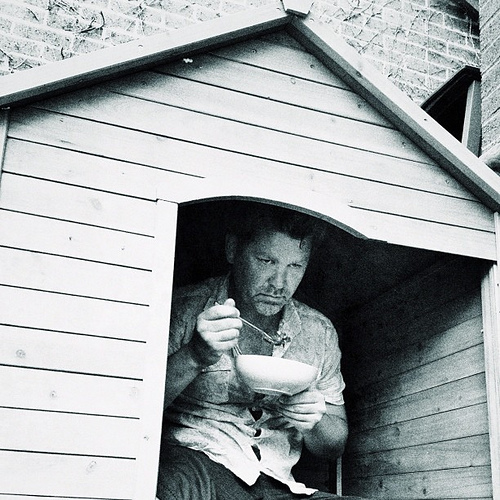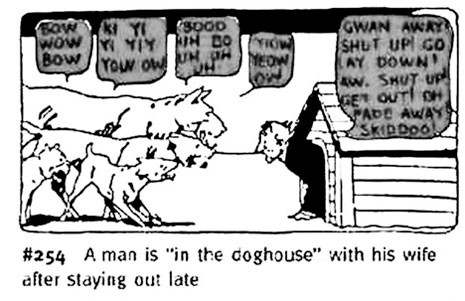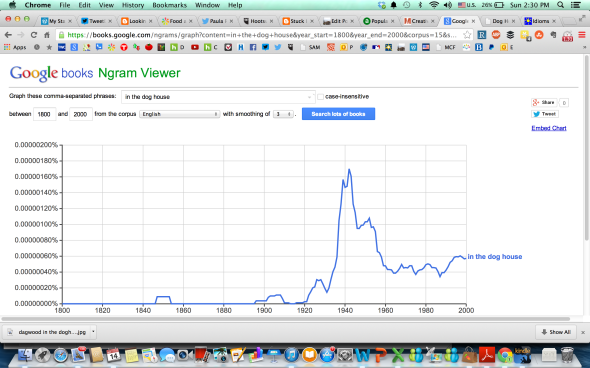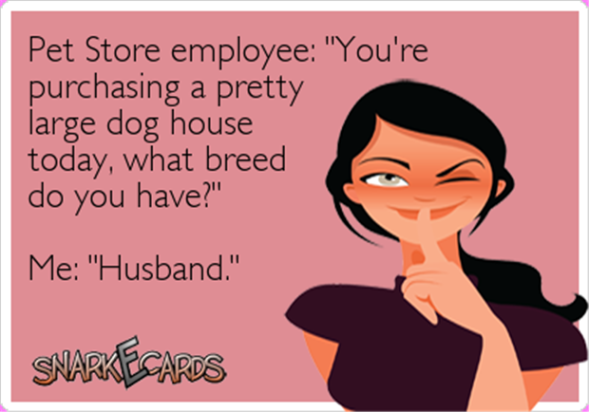In the Doghouse
15September 15, 2014 by Paula Reed Nancarrow
The StoryMN slam theme for October is “In the Dog House.”

In the Doghouse, Again. Graham Smith. Creative Commons License, Some Rights Reserved.
Again, we are working this season with clichés – although where you will find this phrase explained, if you need an explanation, is in a dictionary of idioms.
Allow me my bit of pedantry. There’s a difference.
Idioms are always figurative – they mean something other than what they actually say. Clichés are phrases that have become trite or meaningless through overuse. Using them can make your writing seem shallow, unoriginal. But cliches don’t have to be figurative – last month’s YOLO, or “you only live once” is certainly meant to be taken literally.
Idioms, taken literally, often make no sense.
And when you use an idiom you definitely do not want to be original, as any non-native speaker can tell you. Using an idiom correctly depends on getting the phrase and the context in which it can be used exactly right.
It is not enough to know that “you’re in the dog house now” means that you are in trouble or disfavor with someone. You also have to know, when you wish to express such menacing displeasure yourself, that “you’re in a dog house now” simply isn’t going to cut it. The definite article is required.
Several sources rather confidently proclaim the first idiomatic use of “in the doghouse” is in Peter Pan.
Much as I like to believe this, it’s not true. And it won’t kill Tinkerbell to say so.
The word used in the1911 novel, as well as the play that predates it, is “kennel,” which was more common across the pond than “doghouse” at the time. Nor is the first print usage in the 1926 dictionary of “criminalese” cited by the source that refutes the J. M. Barrie hypothesis.
We can credit Winsor McCay with the earliest use of the idiom in print – between 1904 and 1905. But it was clearly in use before then – note the parentheses – at least in conversational speech.
Winsor McCay was a cartoonist and early animation pioneer – that famous first animation, “Gertie the Dinosaur” was his work. He also did the better known strip Little Nemo, which took the same hallucinogenic approach to the subconscious as Dream of the Rarebit Fiend. Children, however, don’t seem to need melted cheese on toast before bed to be exposed to the darker side of their psyches.
This particular strip apparently accurately reflects the marital relationship between Winsor and his wife Maude.
Like YOLO, the idiom comes with a soundtrack.
There’s a song in 1939 by Buddy Jones, and a couple other songs with “In the Doghouse” in their titles copyrighted between 1941 and 1942.
I’m particularly fond of Brenda Lee’s version of “You’re in the Doghouse Now,” from the Dick Tracy movie. It’s got a lot of sass.
Note that neither of these songs appear to be about husbands and wives. Perhaps that is why I like them. The power dynamic seems more open and playful. More of a choice, even within the roles assigned. I could be fooling myself there.
And then there’s the Ngram viewer on Google Books.
It’s a fascinating tool for visualizing how words and phrases are used over time. The Ngram shows “in the doghouse” peaking in 1942 and declining steadily from there, except for a short uptake in 1952. So if we really want to consider “in the dog house” an overused cliché, I think we have to admit it is a rather retro one.
And nothing really explains to me why the peak use of the phrase in print comes in the middle of World War II. Perhaps women at home without men all decided they needed dogs to deter burglars, and there were just more dog houses around to be in (albeit fewer husbands to confine there for bad behavior). Still, if you examine the printed matter Google has digitized from the period, you’d think every teenage boy was reading Popular Mechanics and building a home for Lassie.
The gender stereotypes associated with the idiom haven’t changed much since Winsor McKay.
Searching for images related to the phrase, the most popular subgroup is “husband.” The implication is that while a man may think his home is his castle, displeasing his wife is the surest way to get expelled from it; that a husband’s power is in his ability to provide comfort and security, and a wife’s in her ability to withhold it.
This is not a dynamic that played much of a part in my own marriage, to be honest. That’s not to say that I don’t have a story in mind. One that I think will go beyond snark as well as stereotype. Whether it is slam worthy remains to be seen.
Share this:
Related
Category: Uncategorized | Tags: cliché, Doghouse, family life, gender roles, idiom, J. M. Barrie, marriage, Ngram, Peter Pan, stereotype, Winsor McCay, Work in Process






Ah, thanks for this! Never quite understood the idiom. That kind of insight is worth an arm and a leg!
LikeLike
Thanks, Greg. Your comment makes me feel like a million bucks. ;-)
LikeLike
Love this post, Paula! Much fun, and I learned a lot too!
LikeLike
Thank you Mary. I had fun writing it, too…
LikeLike
Love idioms and cliches for their pre-twitter pithiness! Can’t tell you how many times I had to stop and explain a turn of phrase during all my years lecturing and training–especially to students or clients for whom English isn’t a first language. An opening to some great discussions, btw. Thanks for the post!
LikeLike
Thanks, Anna. Yes, I worked for a place that taught English Language Learners for a couple of years. The mistakes are usually more rational than the language, and always interesting.
LikeLike
I always enjoy the back story of idioms and odd words. Thanks!
LikeLike
Back stories are the best stories, aren’t they… thanks for taking the time to stop by, Charli.
LikeLike
YOLO needs to go away and never come back.
LikeLike
Sorry, Kat – somehow I missed this in the hustle and bustle of #MondayBlogs. You may well be right about that; I certainly didn’t have much respect for the acronym by the time I finished the post.
LikeLike
You write about such fascinating topics, Paula, love your take on this. The way you illustrate your articles is FABULOUS if you’ll pardon the all caps.
LikeLike
Thanks, Jann. I’m told that people on Twitter share posts more if they come with an illustration, but I sometimes worry that they interrupt the written flow of the piece. Still, I enjoy finding them.
LikeLike
I’m going to throw out a bold and not necessarily supportable hypothesis – what if the decline of “in the doghouse” relates to the shift in gender relations that’s occurred since WWII? Back in the forties and fifties, the “woman’s place was in the home,” which, to a certain extent, made it her domain – one from which she could expel a misbehaving husband. Nowadays, women and men tend to occupy more equal roles in both their home and professional lives, which would diminish the woman’s perceived dominance over domestic affairs. I would also suggest that the increase in use of the phrase in the early decades of the last century, and particularly during the baby boom generation, relates to the shift to suburban housing, which made the construction of the “doghouse” possible. Not that any of this has to do with your story slam… but gosh darn it, Paula, you made me think! ;)
LikeLike
Interesting, Lori. I did find one history of dog houses, believe it or not. It noted the architectural connection between the Victorian pitched roofs and the rise of dog breeding in the 1800s, as well as the fact that after World War II, despite all those Popular Mechanics articles, far more dog houses were being mass produced. http://all-about-dog-houses.com/docs/dog-house-history.htm.
My own observation – also with no science behind it – is that these days dogs are treated far more like members of the family, and in wealthy surburban neighborhoods, it’s considered cruel to house a dog outside. Hence there is no doghouse to consign a husband to. The phrase does seem to persist as a way of emasculating the subject, or making a battle seem petty and unreasonable. “Obama’s in the doghouse with Congress” seems a common usage these days.
LikeLike
That’s very true – there are more dogs living indoors nowadays, especially with the growing popularity of smaller breeds.
And as for politicians, perhaps they should all be consigned to the doghouse until they learn to get along ;)
LikeLike